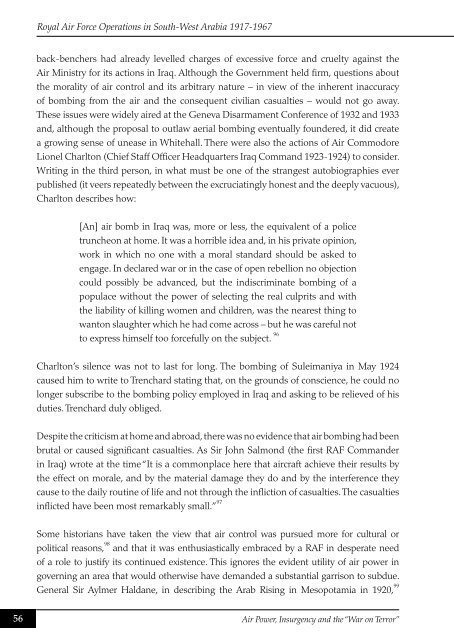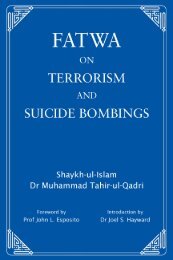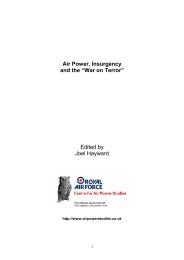Air Power, Insurgency and the âWar on Terrorâ - Prof. Joel Hayward's ...
Air Power, Insurgency and the âWar on Terrorâ - Prof. Joel Hayward's ...
Air Power, Insurgency and the âWar on Terrorâ - Prof. Joel Hayward's ...
Create successful ePaper yourself
Turn your PDF publications into a flip-book with our unique Google optimized e-Paper software.
Royal <str<strong>on</strong>g>Air</str<strong>on</strong>g> Force Operati<strong>on</strong>s in South-West Arabia 1917-1967<br />
back-benchers had already levelled charges of excessive force <str<strong>on</strong>g>and</str<strong>on</strong>g> cruelty against <str<strong>on</strong>g>the</str<strong>on</strong>g><br />
<str<strong>on</strong>g>Air</str<strong>on</strong>g> Ministry for its acti<strong>on</strong>s in Iraq. Although <str<strong>on</strong>g>the</str<strong>on</strong>g> Government held firm, questi<strong>on</strong>s about<br />
<str<strong>on</strong>g>the</str<strong>on</strong>g> morality of air c<strong>on</strong>trol <str<strong>on</strong>g>and</str<strong>on</strong>g> its arbitrary nature – in view of <str<strong>on</strong>g>the</str<strong>on</strong>g> inherent inaccuracy<br />
of bombing from <str<strong>on</strong>g>the</str<strong>on</strong>g> air <str<strong>on</strong>g>and</str<strong>on</strong>g> <str<strong>on</strong>g>the</str<strong>on</strong>g> c<strong>on</strong>sequent civilian casualties – would not go away.<br />
These issues were widely aired at <str<strong>on</strong>g>the</str<strong>on</strong>g> Geneva Disarmament C<strong>on</strong>ference of 1932 <str<strong>on</strong>g>and</str<strong>on</strong>g> 1933<br />
<str<strong>on</strong>g>and</str<strong>on</strong>g>, although <str<strong>on</strong>g>the</str<strong>on</strong>g> proposal to outlaw aerial bombing eventually foundered, it did create<br />
a growing sense of unease in Whitehall. There were also <str<strong>on</strong>g>the</str<strong>on</strong>g> acti<strong>on</strong>s of <str<strong>on</strong>g>Air</str<strong>on</strong>g> Commodore<br />
Li<strong>on</strong>el Charlt<strong>on</strong> (Chief Staff Officer Headquarters Iraq Comm<str<strong>on</strong>g>and</str<strong>on</strong>g> 1923-1924) to c<strong>on</strong>sider.<br />
Writing in <str<strong>on</strong>g>the</str<strong>on</strong>g> third pers<strong>on</strong>, in what must be <strong>on</strong>e of <str<strong>on</strong>g>the</str<strong>on</strong>g> strangest autobiographies ever<br />
published (it veers repeatedly between <str<strong>on</strong>g>the</str<strong>on</strong>g> excruciatingly h<strong>on</strong>est <str<strong>on</strong>g>and</str<strong>on</strong>g> <str<strong>on</strong>g>the</str<strong>on</strong>g> deeply vacuous),<br />
Charlt<strong>on</strong> describes how:<br />
[An] air bomb in Iraq was, more or less, <str<strong>on</strong>g>the</str<strong>on</strong>g> equivalent of a police<br />
trunche<strong>on</strong> at home. It was a horrible idea <str<strong>on</strong>g>and</str<strong>on</strong>g>, in his private opini<strong>on</strong>,<br />
work in which no <strong>on</strong>e with a moral st<str<strong>on</strong>g>and</str<strong>on</strong>g>ard should be asked to<br />
engage. In declared war or in <str<strong>on</strong>g>the</str<strong>on</strong>g> case of open rebelli<strong>on</strong> no objecti<strong>on</strong><br />
could possibly be advanced, but <str<strong>on</strong>g>the</str<strong>on</strong>g> indiscriminate bombing of a<br />
populace without <str<strong>on</strong>g>the</str<strong>on</strong>g> power of selecting <str<strong>on</strong>g>the</str<strong>on</strong>g> real culprits <str<strong>on</strong>g>and</str<strong>on</strong>g> with<br />
<str<strong>on</strong>g>the</str<strong>on</strong>g> liability of killing women <str<strong>on</strong>g>and</str<strong>on</strong>g> children, was <str<strong>on</strong>g>the</str<strong>on</strong>g> nearest thing to<br />
want<strong>on</strong> slaughter which he had come across – but he was careful not<br />
to express himself too forcefully <strong>on</strong> <str<strong>on</strong>g>the</str<strong>on</strong>g> subject. 96<br />
Charlt<strong>on</strong>’s silence was not to last for l<strong>on</strong>g. The bombing of Suleimaniya in May 1924<br />
caused him to write to Trenchard stating that, <strong>on</strong> <str<strong>on</strong>g>the</str<strong>on</strong>g> grounds of c<strong>on</strong>science, he could no<br />
l<strong>on</strong>ger subscribe to <str<strong>on</strong>g>the</str<strong>on</strong>g> bombing policy employed in Iraq <str<strong>on</strong>g>and</str<strong>on</strong>g> asking to be relieved of his<br />
duties. Trenchard duly obliged.<br />
Despite <str<strong>on</strong>g>the</str<strong>on</strong>g> criticism at home <str<strong>on</strong>g>and</str<strong>on</strong>g> abroad, <str<strong>on</strong>g>the</str<strong>on</strong>g>re was no evidence that air bombing had been<br />
brutal or caused significant casualties. As Sir John Salm<strong>on</strong>d (<str<strong>on</strong>g>the</str<strong>on</strong>g> first RAF Comm<str<strong>on</strong>g>and</str<strong>on</strong>g>er<br />
in Iraq) wrote at <str<strong>on</strong>g>the</str<strong>on</strong>g> time “It is a comm<strong>on</strong>place here that aircraft achieve <str<strong>on</strong>g>the</str<strong>on</strong>g>ir results by<br />
<str<strong>on</strong>g>the</str<strong>on</strong>g> effect <strong>on</strong> morale, <str<strong>on</strong>g>and</str<strong>on</strong>g> by <str<strong>on</strong>g>the</str<strong>on</strong>g> material damage <str<strong>on</strong>g>the</str<strong>on</strong>g>y do <str<strong>on</strong>g>and</str<strong>on</strong>g> by <str<strong>on</strong>g>the</str<strong>on</strong>g> interference <str<strong>on</strong>g>the</str<strong>on</strong>g>y<br />
cause to <str<strong>on</strong>g>the</str<strong>on</strong>g> daily routine of life <str<strong>on</strong>g>and</str<strong>on</strong>g> not through <str<strong>on</strong>g>the</str<strong>on</strong>g> inflicti<strong>on</strong> of casualties. The casualties<br />
inflicted have been most remarkably small.” 97<br />
Some historians have taken <str<strong>on</strong>g>the</str<strong>on</strong>g> view that air c<strong>on</strong>trol was pursued more for cultural or<br />
political reas<strong>on</strong>s, 98 <str<strong>on</strong>g>and</str<strong>on</strong>g> that it was enthusiastically embraced by a RAF in desperate need<br />
of a role to justify its c<strong>on</strong>tinued existence. This ignores <str<strong>on</strong>g>the</str<strong>on</strong>g> evident utility of air power in<br />
governing an area that would o<str<strong>on</strong>g>the</str<strong>on</strong>g>rwise have dem<str<strong>on</strong>g>and</str<strong>on</strong>g>ed a substantial garris<strong>on</strong> to subdue.<br />
General Sir Aylmer Haldane, in describing <str<strong>on</strong>g>the</str<strong>on</strong>g> Arab Rising in Mesopotamia in 1920, 99<br />
56<br />
<str<strong>on</strong>g>Air</str<strong>on</strong>g> <str<strong>on</strong>g>Power</str<strong>on</strong>g>, <str<strong>on</strong>g>Insurgency</str<strong>on</strong>g> <str<strong>on</strong>g>and</str<strong>on</strong>g> <str<strong>on</strong>g>the</str<strong>on</strong>g> “War <strong>on</strong> Terror”





